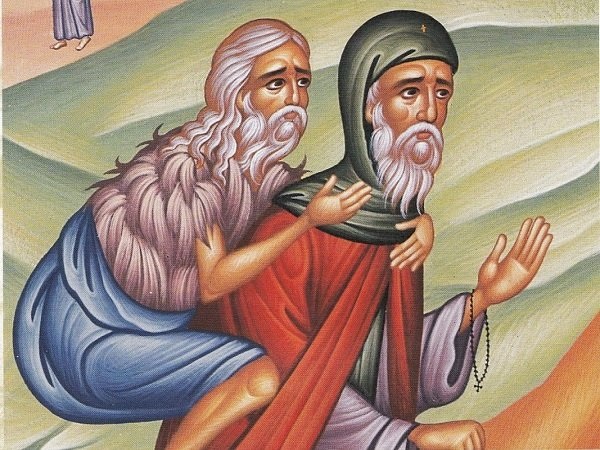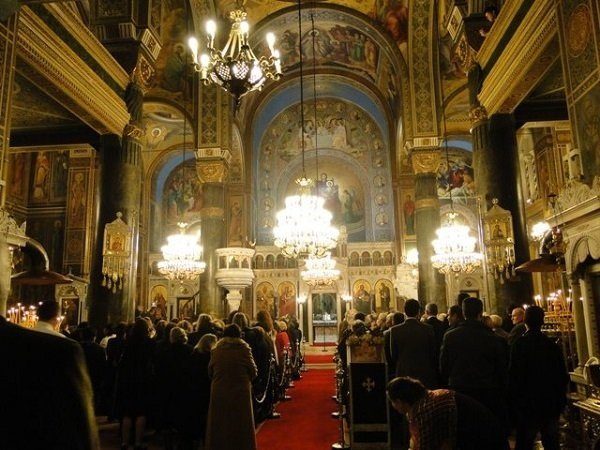When we have the peace of God within us and the soul is convinced that God is indeed our Father, who governs creation, and that we are children of this Almighty God, who sustains creation, we’re in no danger and need not fear anything. When we’re at peace with God, we’re also at peace with other people. We cease to see others as our enemies, but, instead, see them as our God: ‘If you’ve seen your brother or sister, you’ve seen the Lord your God’. For people of God, each person is ‘very good’, as God the Creator made them. The heart of the people of God cannot speak evil, since evil doesn’t exist for them. Of course, they aren’t naïve. They simply don’t accept that God’s creature, who was made in the image of our good God, is evil and wishes us harm. This doesn’t mean that the people of God are simple-minded and gullible; that because they’re certain that they aren’t in danger from anything, they won’t have bad relations with other people.

People of God, who are certain about the existence of God, fear nothing and no-one. The peace of God has incredible social repercussions. When envy, suspicion and fear have been abolished, what reason is there for us not to be united in love for one another, in the family and in our everyday lives? But if the peace of God is absent, then we’re jealous and afraid of each other and we function within a spirit of suspicion and loss of God’s peace. We’re under pressure from the wickedness that resides within us, because, lacking God’s grace, we haven’t ascended through the pall of evil that covers this world. Naturally, we fear not only our brothers and sisters and other people, but also our environment. We feel under threat from everywhere. We often feel we don’t want to be exposed, out on a limb somewhere, because we don’t know what’s happening there. We don’t feel peace in our soul. The peace which has its source in God is diffused into the surrounding environment. This is how people of God can live anywhere and become friends with the creation and at peace with it. Many saints lived with wild animals. Saint Gerasimos, on the River Jordan lived with a lion, and Saint Païsios lived comfortably with wild animals because, like all other saints, he had become peaceful with God. Saint Païsios lived in a ravine, in a terrifying place, as are all the hermitages on the Holy Mountain. He felt no fear there; everything around him was so familiar and beautiful that he felt as if he was living in the most pleasant place in the world. Today we can live in a city with many other people and yet be afraid because we’ve lost the peace of God in that environment.
So this peace of God which is given to people through a particular process, then has repercussions on the whole of our life and is specific, real and absolute. This is given by the Church. But how does this happen in practice? Is it possible for people who are in the world and who live their everyday lives, with all their problems and dangers, to experience the peace of God and his gifts, or are these only for one particular group of people? Christ called everyone to him and offers himself to all of us, within the Church.
We’re children of the Church, of the Mother that God endowed and enriched with all the gifts that he brought with his incarnation and the descent of the Holy Spirit. We can therefore share in the peace of God. In this way, the hymn of the angels [‘Glory to God in the highest and on peace…’] was confirmed and made reality in our heart and continues to be so. Christ doesn’t see people as a mass, he sees each person as unique, heals each of us separately, and retains the persona of each of us. He doesn’t make us all the same. The guarantee of and respect for our freedom demonstrates that peace is achieved within each one of us individually and provides us with a path, a path towards our encounter with Christ. The saints themselves have shown us that this peace exists on earth and is offered and given to us. When our heart is open to grace, it communes with it and ascends above the events of this world.
God’s peace is offered to each of us. We can enjoy it: ‘Come and see’, says Christ. ‘Taste and see that the Lord is good’. The Church has always spoken with complete certainty and authority because it has held experience in its hands. This experience is offered to everyone and each of us can and should investigate and prove it, to ourselves and to the milieu in which we live. God saved the whole human person, and it’s a grave error for us to think that there could be a circumstance in which he can’t save us. Or that it could ever be possible for our own wickedness and the evil and might of other powerful forces to confound him or impede his work and his providence. Victory belongs to God: ‘Our faith is the victory which has triumphed over the world’. Christ defeated the world, fear and anxiety and has given himself to us as our true peace. So we’re joyful and peaceful. We fear nothing, but tread our path, having in our heart this deep peace of which the angels sang and which all the saints experienced. And which our Church preserves to this day as a precious treasure.

















